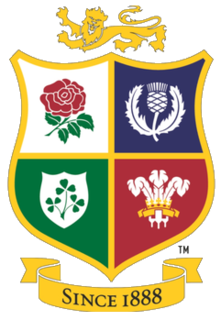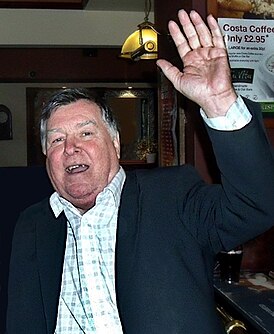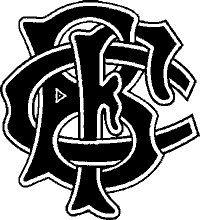
The British & Irish Lions is a rugby union team selected from players eligible for the national teams of England, Ireland, Scotland, and Wales. The Lions are a test side and most often select players who have already played for their national team, although they can pick uncapped players who are eligible for any of the four unions. The team currently tours every four years, with these rotating between Australia, New Zealand and South Africa in order. The most recent test series, the 2021 series against South Africa, was won 2–1 by South Africa.

Newport Rugby Football Club is a Welsh rugby union club based in the city of Newport, South Wales. They presently play in the Welsh Premier Division. Until 2021 Newport RFC were based at Rodney Parade situated on the east bank of the River Usk.

Barry John is a former Welsh rugby union fly-half who played, during the amateur era of the sport, in the 1960s, and early 1970s. John began his rugby career as a schoolboy playing for his local team Cefneithin RFC before switching to first-class west Wales team Llanelli RFC in 1964. It was while at Llanelli that John was first selected for the Wales national team, a shock selection as a replacement for David Watkins to face a touring Australian team.

The Barbarian Football Club is a British invitational rugby union club made up of two teams. The Barbarians play in black and white hoops, though players wear socks from their own club strip. Membership is by invitation; as of 2011, players from 31 countries have played for them. Traditionally at least one uncapped player is selected for each match.

The Australia national rugby union team, nicknamed the Wallabies, is the representative national team in the sport of rugby union for the nation of Australia. The team first played at Sydney in 1899, winning their first test match against the touring British Isles team.
The South is a select rugby union team that draws its players from the South of Scotland, mainly the Scottish Borders where there has always been a proud tradition of rugby union. Historically the South team played matches against touring teams visiting Scotland from abroad, and also competed in the Scottish Inter-District Championship. After rugby union became a professional sport in 1995, the team was replaced in 1996 by the new Border Reivers team based in the same geographical area as the South and who wore the same colours as the old team.
The All Blacks XV is the second national Rugby Union team of New Zealand, behind the All Blacks. The second national XV of New Zealand have had numerous names in their history: Junior All Blacks, New Zealand XV, New Zealand A, New Zealand B, All Blacks XV.

Michael Alan Burton is a former English rugby union footballer, who won a reputation as an uncompromising prop forward for Gloucester, England and the British and Irish Lions.

South African Barbarians is an invitational rugby union club styled along the lines of Barbarian F.C. It was formed in 1960 by Frank Mellish, the former 1951–52 Springbok selector and manager, together with former Natal Rugby Union President, Harry Stacey. The club is directly affiliated to the South African Rugby Union.
In 1977 the British Lions rugby union team toured New Zealand. The Lions played 26 matches, including four internationals against the All Blacks. They lost the series against the All Blacks by three matches to one. The team played as the British Isles in their internationals against the All Blacks and the British Lions for the non-international games. Unlike all previous tours to New Zealand, the Lions did not play any matches in Australia, though one game was also played at Buckhurst Park, Suva, against Fiji.
A test match in rugby union is an international match, usually played between two senior national teams, that is recognised as such by at least one of the teams' national governing bodies.
In 1978 the New Zealand national rugby union team, the All Blacks, toured Britain and Ireland. They were the eighth All Black team to undertake a full tour of the countries and became the first to achieve a Grand Slam by beating the national teams of Ireland, Wales, England and Scotland. The previous seven touring teams had either lost or drawn at least one international, or had not played all four nations.
The 1975–76 Australia rugby union tour of Britain and Ireland was a series of matches played by the Australia national rugby union team. The team was referred to as the "Sixth Wallabies", although they were actually only the fifth Australian touring team to undertake a full tour of Britain & Ireland; the "Second Wallabies" of 1939–40 had to return home without playing a game when the World War II broke out.

Established in 1950, The East Africa rugby union team is a multi-national rugby union team drawing players from Kenya, Uganda and Tanzania, though the vast majority of these came from Kenya which has traditionally been the strongest rugby playing nation in this part of the world. The team has played against incoming international, representative and club touring sides and it conducted seven tours between 1954 and 1982.
Glamorgan County RFC is a Welsh rugby union club that manages an invitational team, known as Glamorgan that originally played rugby at county level. The team is made up of amateur players from sports clubs in the Glamorgan region and historically played matches against other county teams from Wales and England, and during the 20th century was a key fixture for touring international teams. Today the club manages Glamorgan's premier rugby union tournament, the Glamorgan County Silver Ball Trophy, and arranges invitational Glamorgan teams to face Welsh rugby clubs during celebrations, such as anniversaries.
The 2011 mid-year rugby union tests featured only seven matches due to the upcoming 2011 Rugby World Cup. No test series took place, although the Barbarians did play two matches in the United Kingdom; England and Wales. New Zealand and Australia hosted a respective Tier 2 side, Australia hosted Samoa, New Zealand hosted Fiji. Argentina hosted the French Barbarians, while Japan played a Top League XV side in Tokyo.
The 2012 mid-year rugby union tests refer to the rugby union Internationals that were played through June, mostly in the Southern Hemisphere.

Luke Romano is a New Zealand rugby union footballer who plays as a lock for the Blues in Super Rugby and Canterbury in the Mitre 10 Cup. He played for the All Blacks from 2012 - 2017 and was a key member of 2015 Rugby World Cup winning team.
The 1967 New Zealand rugby union tour of Great Britain, France and Canada was a tour undertaken by the New Zealand national rugby union team. The series consisted of 17 matches, four of Test status against international opposition. The New Zealand team finished the tour undefeated, the first time they had achieved this in the Northern hemisphere since the 1924–25 Invincible team.








